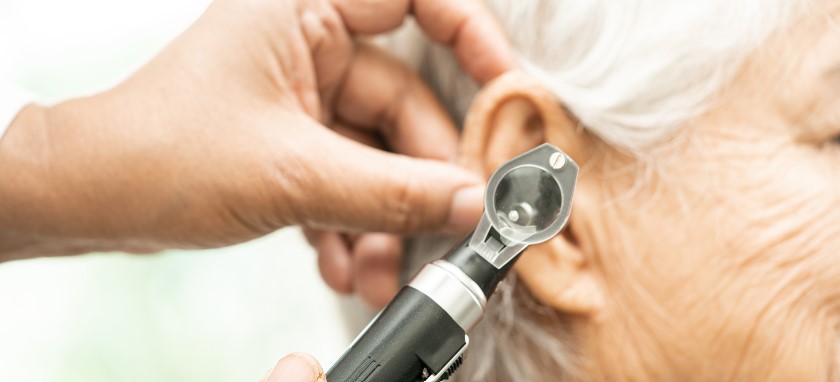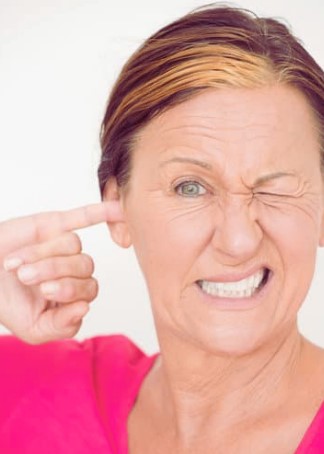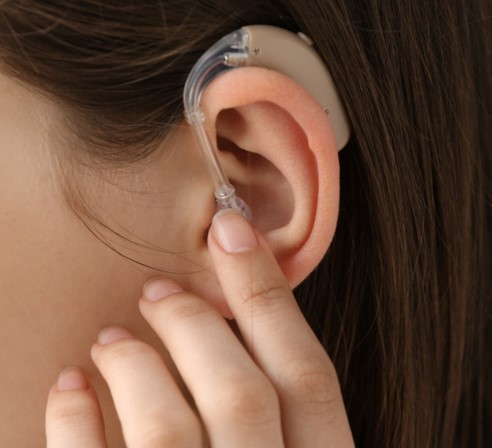That maddening tickle deep inside the ear can quickly become an irresistible urge to scratch, distracting you from everything else. Whether it’s a fleeting itch or persistent irritation, the sensation demands attention.
Itchy ears are a common complaint, affecting nearly everyone at some point. Studies suggest that 15-20% of people experience chronic or recurring ear itching, often due to underlying conditions.
- Why Are Itchy Ears So Common?
- Treating Itchy Ears
- Who Is Prone to Itchy Ears?
- Itchy Ears With Hearing Aids
Why Are Itchy Ears So Common?
Itchy ears occur for many reasons, often related to the ear’s sensitive anatomy or external factors. Below are the most common causes:
- Delicate Nature of the Ear Canal:
The thin, sensitive skin of the ear canal is prone to irritation from dryness, infection, or minor trauma. Its warm, dark environment fosters bacterial growth, limiting its natural healing capacity. - Moisture and Temperature Fluctuations:
Activities like swimming or showering introduce moisture to the ear canal, creating an ideal environment for bacterial and fungal infections. - Earwax Production Variability:
Earwax protects and lubricates the ear canal, but imbalances can cause problems. Too little earwax leads to dryness and itching, while too much causes blockage and irritation. Over-cleaning or the use of ear devices can disrupt this balance. - Frequent Use of Ear Devices:
Earbuds, hearing aids, and earplugs can trap moisture and bacteria, leading to irritation. Ill-fitting devices may rub against the skin, causing inflammation and itchiness. - Allergies:
Seasonal allergies or food sensitivities can cause itchy ears. Allergic reactions may also occur from hair or personal care products. - Dry Skin:
Aging or cold weather can result in dry, flaky skin in the ear canal, which lacks oil glands and relies on earwax for moisture. - Skin Conditions:
Eczema, psoriasis, and similar conditions can affect the ear canal, causing itching, inflammation, and discomfort. - Use of Personal Care Products:
Residue from shampoos, soaps, or hair products can irritate the ears and trigger itching. - Hormonal Fluctuations:
Hormonal changes during pregnancy, menopause, or menstrual cycles can make ears more prone to itching. - Medications:
Certain drugs, including diuretics and antibiotics, can cause itching as a side effect. - Medical Conditions:
Diabetes increases susceptibility to fungal or bacterial infections in the ear canal. - Otitis Externa (Swimmer’s Ear):
An outer ear infection caused by trapped moisture, leading to bacterial or fungal growth, itching, and other symptoms like pain or discharge.

Treating Itchy Ears
Managing itchy ears effectively depends on the underlying cause. Here are some common treatments:
- Proper Ear Hygiene:
Avoid over-cleaning the ears. Professionals recommend cleaning only the outer ear with a soft cloth and allowing the ear canal to self-clean. - Earwax Management:
For earwax buildup, ENTs may recommend ear drops, irrigation, or professional removal. Never use sharp objects to remove earwax. - Moisturizing Ear Drops:
Oil-based ear drops or moisturizers can help relieve dryness and maintain the ear canal’s natural moisture. - Allergy Management:
Antihistamines, avoiding allergens, or switching to hypoallergenic hearing aid materials can alleviate itching caused by allergies. - Infection Treatment:
Doctors may prescribe antibiotics or antifungal medications for bacterial or fungal infections. Keeping ears dry is essential during treatment. - Managing Skin Conditions:
Dermatologists can prescribe corticosteroid creams or ointments for conditions like eczema or psoriasis affecting the ears. - Medical Conditions Management:
Controlling underlying conditions like diabetes or immune disorders helps prevent complications that can cause itchy ears.
Who Is Prone to Itchy Ears?
 Certain groups are more likely to experience itchy ears:
Certain groups are more likely to experience itchy ears:
- People with Skin Conditions: Those with eczema, psoriasis, or seborrheic dermatitis.
- Swimmers: Frequent exposure to moisture increases the risk of swimmer’s ear.
- Allergy Sufferers: Individuals with environmental or food allergies.
- Hearing Aid Users: Hearing aids can trap moisture and bacteria.
- Frequent Ear Cleaners: Over-cleaning strips away protective earwax.
- Elderly Individuals: Age-related dryness increases susceptibility.
- People with Earwax Buildup: Excess cerumen can irritate the ear canal.
- Persons with Diabetes: More prone to infections like otitis externa.
Itchy Ears With Hearing Aids
 Hearing aids can sometimes exacerbate itchy ears due to various factors:
Hearing aids can sometimes exacerbate itchy ears due to various factors:
- Poor Fit: Ill-fitting devices cause friction and irritation.
- Solution: Adjust or re-fit the hearing aid with an audiologist’s help.
- Allergic Reactions: Some materials in hearing aids may cause allergies.
- Solution: Switch to hypoallergenic materials or custom molds.
- Moisture Buildup: Hearing aids can trap moisture, promoting bacteria.
- Solution: Use a hearing aid dryer or dehumidifier.
- Earwax Production Changes: Hearing aids may lead to increased earwax.
- Solution: Regular earwax management with ear drops or professional cleaning.
- Bacteria and Allergens: Hearing aids accumulate dirt and bacteria.
- Solution: Clean and maintain devices regularly.
- Skin Conditions: Conditions like eczema can worsen with hearing aid use.
- Solution: Use prescribed treatments to manage symptoms.
When to Seek Help
Seek professional advice if:
- Itching lasts more than a few days.
- You experience pain, hearing loss, or discharge.
- Signs of infection, such as redness or swelling, are present.
- Over-the-counter treatments fail to resolve the issue.
Conclusion
Itchy ears are a common but often manageable condition stemming from the ear’s sensitivity and various external or internal factors. While occasional itching is normal, persistent symptoms may signal an underlying issue such as an infection, allergy, or skin disorder.
Proper hygiene, device maintenance, and professional care are essential for preventing and treating itchy ears effectively.
References:
- WebMD. (n.d.). Why do my ears itch? Retrieved from https://www.webmd.com/cold-and-flu/ear-infection/why-do-my-ears-itch
- Roland, P. S., & Smith, T. L. (1999). Practical management of external otitis. *American Family Physician*, *59*(9), 2465-2472. https://www.ncbi.nlm.nih.gov/pmc/articles/PMC1575666/
- Ghosh, A., Pal, S. K., & Paul, B. R. (2019). Evaluation and management of ear itching: Our experience. *Bengal Journal of Otolaryngology and Head Neck Surgery, 27*(3), 185-191. https://bjohns.in/journal3/index.php/bjohns/article/download/387/307/1707
- Shapiro, W. H. (2014). Symptom: Itchy ear. *The Hearing Journal, 67*(9), 26-28. https://journals.lww.com/thehearingjournal/fulltext/2014/09000/symptom__itchy_ear.4.aspx
- Kaur, R., & Agrawal, A. (2021). Evaluation and management of ear itching: Our experience. *Indian Journal of Otolaryngology and Head & Neck Surgery*. https://www.researchgate.net/publication/354913504_Evaluation_and_management_of_ear_itching_our_experience
- Agrawal, A., Poojary, D., & Gupta, R. (2020). Chronic itching in ears: Causes and management. *Journal of Otolaryngology-Head & Neck Surgery, 49*(3), 217-223. https://www.ncbi.nlm.nih.gov/pmc/articles/PMC11213299/
About the Author
 Nausheen Dawood is an experienced Audiologist and Project Manager with a professional background including primary health care, corporate social investment, and business development. Proficient in the development of academic courses, training, and lecturing, with a focus on clinical student training and supervision. Adept in freelance copywriting, particularly in audiology and health-related topics. Holds a Masters degree in Audiology (Cum Laude), with a strong foundation in clinical research, project development, and strategic planning, complemented by technical training. Specializes in content development and training tailored to diverse audiences. Demonstrates a long-term commitment to research and development, including the implementation of randomized controlled trials, projects, and clinical examinations. Known for establishing robust networks and cultivating valuable stakeholder relationships.
Nausheen Dawood is an experienced Audiologist and Project Manager with a professional background including primary health care, corporate social investment, and business development. Proficient in the development of academic courses, training, and lecturing, with a focus on clinical student training and supervision. Adept in freelance copywriting, particularly in audiology and health-related topics. Holds a Masters degree in Audiology (Cum Laude), with a strong foundation in clinical research, project development, and strategic planning, complemented by technical training. Specializes in content development and training tailored to diverse audiences. Demonstrates a long-term commitment to research and development, including the implementation of randomized controlled trials, projects, and clinical examinations. Known for establishing robust networks and cultivating valuable stakeholder relationships.






